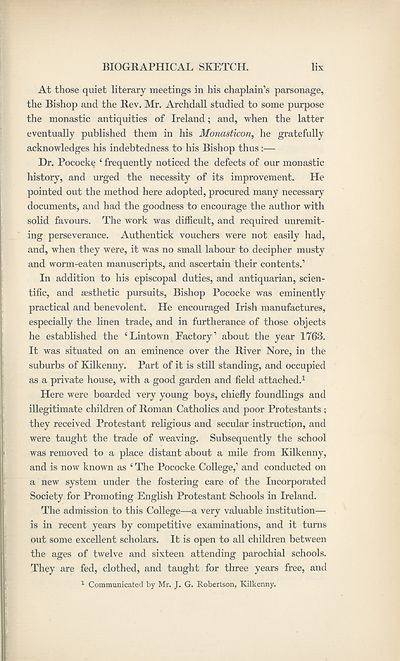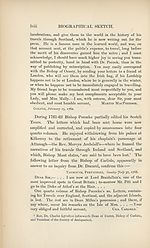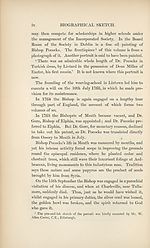Series 1 > Tours in Scotland 1747, 1750, 1760
(76) Page lix
Download files
Complete book:
Individual page:
Thumbnail gallery: Grid view | List view

BIOGRAPHICAL SKETCH.
lix
At those quiet literary meetings in his chaplain’s parsonage,
the Bishop and the Rev. Mr. Archdall studied to some purpose
the monastic antiquities of Ireland; and, when the latter
eventually published them in his Monasticon, he gratefully
acknowledges his indebtedness to his Bishop thus:—
Dr. Pococke ‘ frequently noticed the defects of our monastic
history, and urged the necessity of its improvement. He
pointed out the method here adopted, procured many necessary
documents, and had the goodness to encourage the author with
solid favours. The work was difficult, and required unremit-
ing perseverance. Authentick vouchers were not easily had,
and, when they were, it was no small labour to decipher musty
and worm-eaten manuscripts, and ascertain their contents.’
In addition to his episcopal duties, and antiquarian, scien¬
tific, and aesthetic pursuits, Bishop Pococke was eminently
practical and benevolent. He encouraged Irish manufactures,
especially the linen trade, and in furtherance of those objects
he established the ‘Lintown Factory’ about the year 1763.
It was situated on an eminence over the River Nore, in the
suburbs of Kilkenny. Part of it is still standing, and occupied
as a private house, with a good garden and field attached.1
Here were boarded very young boys, chiefly foundlings and
illegitimate children of Roman Catholics and poor Protestants;
they received Protestant religious and secular instructipn, and
were taught the trade of weaving. Subsequently the school
was removed to a place distant about a mile from Kilkenny,
and is now known as ‘ The Pococke College,’ and conducted on
a new system under the fostering care of the Incorporated
Society for Promoting English Protestant Schools in Ireland.
The admission to this College—a very valuable institution—
is in recent years by competitive examinations, and it turns
out some excellent scholars. It is open to all children between
the ages of twelve and sixteen attending parochial schools.
They are fed, clothed, and taught for three years free, and
1 Communicated by Mr. J. G. Robertson, Kilkenny.
lix
At those quiet literary meetings in his chaplain’s parsonage,
the Bishop and the Rev. Mr. Archdall studied to some purpose
the monastic antiquities of Ireland; and, when the latter
eventually published them in his Monasticon, he gratefully
acknowledges his indebtedness to his Bishop thus:—
Dr. Pococke ‘ frequently noticed the defects of our monastic
history, and urged the necessity of its improvement. He
pointed out the method here adopted, procured many necessary
documents, and had the goodness to encourage the author with
solid favours. The work was difficult, and required unremit-
ing perseverance. Authentick vouchers were not easily had,
and, when they were, it was no small labour to decipher musty
and worm-eaten manuscripts, and ascertain their contents.’
In addition to his episcopal duties, and antiquarian, scien¬
tific, and aesthetic pursuits, Bishop Pococke was eminently
practical and benevolent. He encouraged Irish manufactures,
especially the linen trade, and in furtherance of those objects
he established the ‘Lintown Factory’ about the year 1763.
It was situated on an eminence over the River Nore, in the
suburbs of Kilkenny. Part of it is still standing, and occupied
as a private house, with a good garden and field attached.1
Here were boarded very young boys, chiefly foundlings and
illegitimate children of Roman Catholics and poor Protestants;
they received Protestant religious and secular instructipn, and
were taught the trade of weaving. Subsequently the school
was removed to a place distant about a mile from Kilkenny,
and is now known as ‘ The Pococke College,’ and conducted on
a new system under the fostering care of the Incorporated
Society for Promoting English Protestant Schools in Ireland.
The admission to this College—a very valuable institution—
is in recent years by competitive examinations, and it turns
out some excellent scholars. It is open to all children between
the ages of twelve and sixteen attending parochial schools.
They are fed, clothed, and taught for three years free, and
1 Communicated by Mr. J. G. Robertson, Kilkenny.
Set display mode to:
![]() Universal Viewer |
Universal Viewer | ![]() Mirador |
Large image | Transcription
Mirador |
Large image | Transcription
Images and transcriptions on this page, including medium image downloads, may be used under the Creative Commons Attribution 4.0 International Licence unless otherwise stated. ![]()
| Scottish History Society volumes > Series 1 > Tours in Scotland 1747, 1750, 1760 > (76) Page lix |
|---|
| Permanent URL | https://digital.nls.uk/126603669 |
|---|
| Attribution and copyright: |
|
|---|
| Description | Over 180 volumes, published by the Scottish History Society, containing original sources on Scotland's history and people. With a wide range of subjects, the books collectively cover all periods from the 12th to 20th centuries, and reflect changing trends in Scottish history. Sources are accompanied by scholarly interpretation, references and bibliographies. Volumes are usually published annually, and more digitised volumes will be added as they become available. |
|---|


